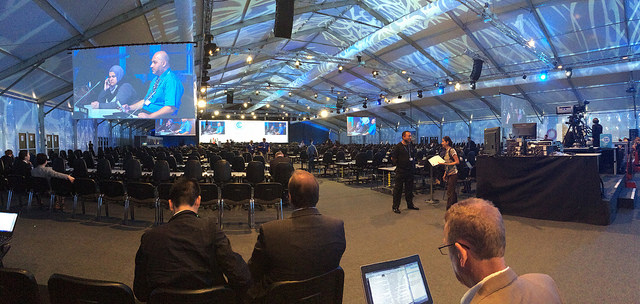Want to sound knowledgeable about United Nations Framework Convention on Climate Change (UNFCCC) policy? Use the word ambition at least three times when discussing climate agreements among parties.
Since COP20 began, the word ‘ambition’ has been thrown around in plenaries, side events, and conversation within civil society to describe agreements for 2015. If you look on the UNFCCC website, you will find the word ambition all over the place, from using it to describe mitigation in the context of the pre-2020 work plan to describing emissions reductions from developed countries and nationally appropriate mitigation actions (NAMAs).

The general consensus among constituencies is that parties need to make ambitious climate agreements, but what does that actually mean? As it stands, the term is fairly vague, and in the event that parties agree on the idea of an ambitious agreement, the lack of a solid definition allows countries to manipulate the term as a way to avoid serious climate pledges.

In the case of the United States, Negotiator Trigg Talley emphasized in a meeting with U.S. non-governmental organizations (NGOs) that the U.S. has set the stage with ambition when pledging $3 billion to the Green Climate Fund (GCF). The GCF was established in Copenhagen in 2009 with the goal of funding adaptation projects for developing countries affected by climate disruption. So far, $10 billion has been pledged by numerous countries.
According to the new UNEP Adaptation Gap Report, adaptation will cost somewhere between $200 billion and $500 billion per year to keep the world below two degrees Celsius -- meaning adaptation funds are grossly underestimated. In this context, $3 billion seems to fall short of ‘ambition,’ especially when considering the U.S.’s lead role in causing climate change. Additionally, U.S. negotiators seem very complacent and satisfied with the recent U.S.-China agreement which has been applauded as ambitious despite the agreement including the advancement of coal technology, nuclear energy, and the expansion of carbon capture and storage.
So, one might wonder how can the UNFCCC process produce anything ambitious when riddled with fossil fuel company influence? According to the recent Intergovernmental Panel on Climate Change (IPCC) report, fossil fuels are responsible for 78 percent of emissions in the atmosphere yet companies such as Chevron, ExxonMobil, BP, and Shell influence the COP negotiations via side events. This is exactly what that took place on Monday when Shell presented its case against divestment in fossil fuel companies.
False solutions -- such as carbon markets via the International Emissions Trading Association (IETA) -- are strongly present at COP20 and present anything but ambition toward actual mitigation. Instead, they excuse big polluters from action by allowing them to buy carbon ‘offsets.’ Japan caused an uproar from civil society when it earned one of the first ‘Fossil of the Day’ awards at COP20 for financing a coal-fired power plant in a developing country using climate finance funds.
So what does ambition actually look like? We need a long-term, equitable, enforceable international agreement based upon science. Countries must be transparent and accountable with their intended nationally-determined contributions (INDCs) with science-based review. More than anything, ambition translates to Lima laying down clear commitments and plans for finance and mitigation in preparation for the COP21 in Paris. Actual action, not just pledges, are needed to prevent an increase in global temperatures more than two degrees Celsius above pre-industrial levels. This powerful commitment needs to be one which maintains a framework of Common But Differentiated Responsibilities, i.e. recognizes historical differences in the contributions of developed and developing States to global environmental problems and is centered around equity.

Negotiators must be held accountable for what they actually mean by “ambitious targets.” I challenge civil society to take back the word ‘ambition’ to show what real climate commitments look like—commitments which will avoid future climate disasters and save countless lives.
Written by: Caroline Engle, Volunteer, Sierra Student Coalition International Climate Campaign
